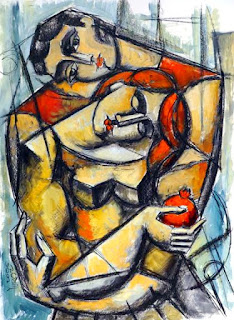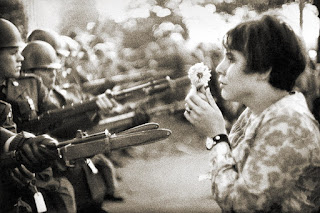 |
| Kant urged that we ‘treat people as ends in themselves, never as means to an end’ |
At its foundation, humanism’s aim is to empower people through conviction in the philosophical bedrock of self-determination and people’s capacity to flourish — to arrive at an understanding of truth and to shape their own lives through reason, empiricism, vision, reflection, observation, and human-centric values. Humanism casts a wide net philosophically — ethically, metaphysically, sociologically, politically, and otherwise — for the purpose of doing what’s upright in the context of individual and community dignity and worth.
Humanism provides social mores, guiding moral behaviour. The umbrella aspiration is unconditional: to improve the human condition in the present, while endowing future generations with progressively better conditions. The prominence of the word ‘flourishing’ is more than just rhetoric. In placing people at the heart of affairs, humanism stresses the importance of the individual living both free and accountable — to hand off a better world. In this endeavour, the ideal is to live unbound by undemocratic doctrine, instead prospering collaboratively with fellow citizens and communities. Immanuel Kant underscored this humanistic respect for fellow citizens, urging quite simply, in Groundwork of the Metaphysics of Morality, that we ‘treat people as ends in themselves, never as means to an end’.
The history of humanistic thinking is not attributed to any single proto-humanist. Nor has it been confined to any single place or time. Rather, humanist beliefs trace a path through the ages, being reshaped along the way. Among the instrumental contributors were Gautama Buddha in ancient India; Lao Tzu and Confucius in ancient China; Thales, Epicurus, Pericles, Democritus, and Thucydides in ancient Greece; Lucretius and Cicero in ancient Rome; Francesco Petrarch, Sir Thomas More, Michel de Montaigne, and François Rabelais during the Renaissance; and Daniel Dennett, John Dewey, A.J. Ayer, A.C. Grayling, Bertrand Russell, and John Dewey among the modern humanist-leaning philosophers. (Dewey contributed, in the early 1930s, to drafting the original Humanist Manifest.) The point being that the story of humanism is one of ubiquity and variety; if you’re a humanist, you’re in good company. The English philosopher A.J. Ayer, in The Humanist Outlook, aptly captured the philosophy’s human-centric perspective:
‘The only possible basis for a sound morality is mutual tolerance and respect; tolerance of one another’s customs and opinions; respect for one another’s rights and feelings; awareness of one another’s needs’.
For humanists, moral decisions and deeds do not require a supernatural, transcendent being. To the contrary: the almost-universal tendency to anthropomorphise God, to attribute human characteristics to God, is an expedient to help make God relatable and familiar that can, at the same time, prove disquieting to some people. Rather, humanists’ belief is generally that any god, no matter how intense one’s faith, can only ever be an unknowable abstraction. To that point, the opinion of the eighteenth-century Scottish philosopher David Hume — ‘A wise man proportions his belief to the evidence’ — goes to the heart of humanists’ rationalist philosophy regarding faith. Yet, theism and humanism can coexist; they do not necessarily cancel each other out. Adherents of humanism have been religious, agnostic, and atheist — though it’s true that secular humanism, as a subspecies of humanism, rejects a religious basis for human morality.
For humanists there is typically no expectation of after-life rewards and punishments, mysteries associated with metaphorical teachings, or inspirational exhortations by evangelising trailblazers. There need be no ‘ghost in the machine’, to borrow an expression from British philosopher Gilbert Ryle: no invisible hand guiding the laws of nature, or making exceptions to nature’s axioms simply to make ‘miracles’ possible, or swaying human choices, or leaning on so-called revelations and mysticism, or bending the arc of human history. Rather, rationality, naturalism, and empiricism serve as the drivers of moral behaviour, individually and societally. The pre-Socratic philosopher Protagoras summed up these ideas about the challenges of knowing the supernatural:
‘About the gods, I’m unable to know whether they exist or do not exist, nor what they are like in form: for there are things that hinder sure knowledge — the obscurity of the subject and the shortness of human life’.
The critical thinking that’s fundamental to pro-social humanism thus moves the needle from an abstraction to the concreteness of natural and social science. And the handwringing over issues of theodicy no longer matters; evil simply happens naturally and unavoidably, in the course of everyday events. In that light, human nature is recognised not to be perfectible, but nonetheless can be burnished by the influences of culture, such as education, thoughtful policymaking, and exemplification of right behaviour. This model assumes a benign form of human centrism. ‘Benign’ because the model rejects doctrinaire ideology, instead acknowledging that while there may be some universal goods cutting across societies, moral decision-making takes account of the often-unique values of diverse cultures.
A quality that disinguishes humanity is its persistence in bettering the lot of people. Enabling people to live more fully — from the material to the cultural and spiritual — is the manner in which secular humanism embraces its moral obligation: obligation of the individual to family, community, nation, and globe. These interested parties must operate with a like-minded philosophical belief in the fundamental value of all life. In turn, reason and observable evidence may lead to shared moral goods, as well as progress on the material and immaterial sides of life’s ledger.Humanism acknowledges the sanctification of life, instilling moral worthiness. That sanctification propels human behaviour and endeavour: from progressiveness to altruism, a global outlook, critical thinking, and inclusiveness. Humanism aspires to the greater good of humanity through the dovetailing of various goods: ranging across governance, institutions, justice, philosophical tenets, science, cultural traditions, mores, and teachings. Collectively, these make social order, from small communities to nations, possible. The naturalist Charles Darwin addressed an overarching point about this social order:
‘As man advances in civilisation, and small tribes are united into larger communities, the simplest reason would tell each individual that he ought to extend his social instincts and sympathies to all the members of the same nation, though personally unknown to him’.
Within humanism, systemic challenges regarding morality present themselves: what people can know about definitions of morality; how language bears on that discussion; the value of benefits derived from decisions, policies, and deeds; and, thornily, deciding what actually benefits humanity. There is no taxonomy of all possible goods, for handy reference; we’re left to figure it out. There is no single, unconditional moral code, good for everyone, in every circumstance, for all time. There is only a limited ability to measure the benefits of alternative actions. And there are degrees of confidence and uncertainty in the ‘truth-value’ of moral propositions.
Humanism empowers people not only to help avoid bad results, but to strive for the greatest amount of good for the greatest number of people — a utilitarian metric, based on the consequences of actions, famously espoused by the eighteenth-century philosopher Jeremy Bentham and nineteenth-century philosopher John Stuart Mill, among others. It empowers society to tame conflicting self-interests. It systematises the development of right and wrong in the light of intent, all the while imagining the ideal human condition, albeit absent the intrusion of dogma.
Agency in promoting the ‘flourishing’ of humankind, within this humanist backdrop, is shared. People’s search for truth through natural means, to advance everyone’s best interest, is preeminent. Self-realisation is the central tenet. Faith and myth are insufficient. As modern humanism proclaims, this is less a doctrine than a ‘life stance’. Social order, forged on the anvil of humanism and its core belief in being wholly responsible for our own choices and lives, through rational measures, is the product of that shared agency.



